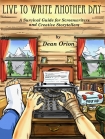Live To Write Another Day by Dean Orion (free ebooks for android .txt) 📕

Read free book «Live To Write Another Day by Dean Orion (free ebooks for android .txt) 📕» - read online or download for free at americanlibrarybooks.com
- Author: Dean Orion
Read book online «Live To Write Another Day by Dean Orion (free ebooks for android .txt) 📕». Author - Dean Orion
The Outline
I remember the first day I arrived for orientation at the American Film Institute. There was a tremendous amount of consternation among the writers in the program because, other than the one hour per week we had as a group with our writing teacher, there really wasn’t a whole lot scheduled for us. In fact, there was nothing else scheduled for us. By contrast, the producer, director, cinematographer, and production design students had all kinds of different classes they were required to take. Finally, someone asked the question: What exactly is it we’re supposed to be doing here as writers? I’ll never forget the somewhat befuddled expression on the face of the admissions director, who was sitting at the front of the room.
“Well,” she said. “You write.”
Like everyone else, I was a very green writer at that point and thought there was some magic bullet, some secret recipe for great writing, that I would now be privy to simply because I had been accepted into film school. The truth is, there really isn’t. I would even go a step further and say that writing is one of those rare things in life that really can’t be taught. You certainly need to acquire all the tools and techniques, attend all the lectures, seminars, and classes you can that identify the common ingredients found in good storytelling; but when it comes to actually preparing the meal, you pretty much have to develop your own recipe and simply start cooking. There’s just no way around that.
This brings me back to the writer gene. Regardless of the medium in which you’re working, if you are truly one of the writer brethren, you will never be intimidated by the countless hours you will have to spend educating yourself on the craft of writing, by having to be both teacher and student, and by all the sweat and toil it will take to tell your stories well. It’ll never be easy, and nothing will test your mettle more than your next task, which is to write a good, solid outline.
The outline is the mechanism by which you assemble your story’s structure, the key element that ultimately determines the quality of your work. Story structure is an extensive topic, one that has been explored by countless other authors, so to stay within the scope of this survival guide I will concentrate on a few fundamental outlining techniques that I use to structure my stories.
First, I study other works that are close in genre, tone, and structure to the story I’m telling. Yeah, I know. More research! It is more research, but it’s a different kind of research than what I described earlier. This time I focus specifically on learning how other writers executed their stories—what they did well and what they did not so well—which means breaking those stories down, scene by scene, to expose the very bones of their structure.
Most of the original stories I write are speculative TV pilots and screenplays, so getting my hands on other writers’ scripts, particularly ones that have actually been produced, is very important. The same thing is true if you’re writing a novel, an interactive game, or any other type of written work. You have to study how other writers have done what you’re now trying to do, and dissect their work rather meticulously in order to learn from them.
Next, I open a document in Final Draft (the screenwriting program most screenwriters use) and start writing down all the scenes I’ve already come up with in my Notes and Concept Documents. At first, I don’t worry so much about the order of the scenes. I just try to get them down on paper, and as I engage in this process, other potential scenes inevitably begin to emerge in my mind, and usually rather quickly. Though I don't yet formally write each scene with action and dialogue, as one does when writing a script, I do use a slug line for each (for example, EXT. DINING HALL – NIGHT) and then simply describe the scene’s content as if I were explaining it to someone in conversation. Later, after I’ve compiled a fair amount of material, I start to work on the structuring (i.e., where each act breaks, and in which order the scenes belong) .
In many cases I can tune in the entire story structure in this way, composing right on my computer, until I have conceived and described all the scenes in the story—which sounds awfully easy when you write it in a sentence like that, but in reality can be incredibly difficult and take weeks to get right. Other times I will use a white board or lay index cards out on a table, each with a single scene written on it, so I can continually rearrange them like pieces of a puzzle. Creative writers of all different stripes commonly use both of these approaches.
Another technique I use, either after I’ve got the whole structure worked out or when I’m still immersed in the outlining process, is to take out my trusty yellow pad and try to write down every scene in the script using just a single line for each. As you might imagine, this is yet another challenging





Comments (0)